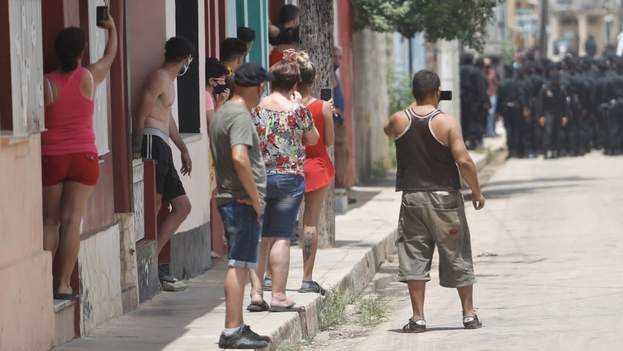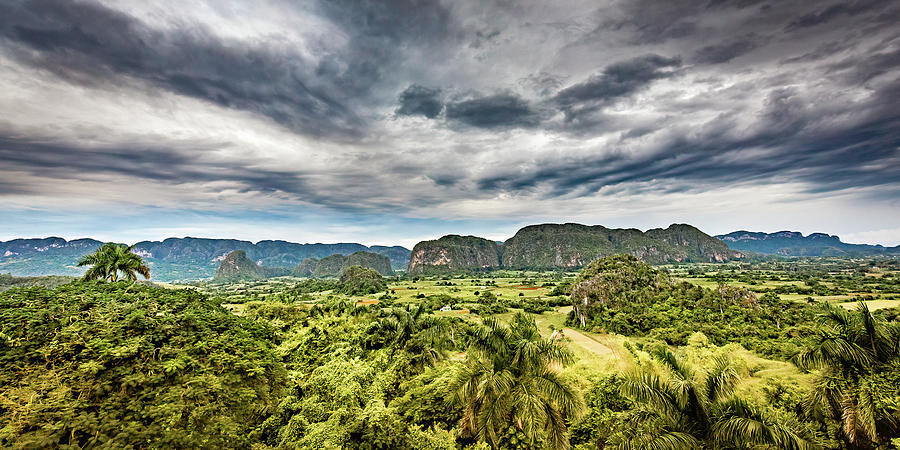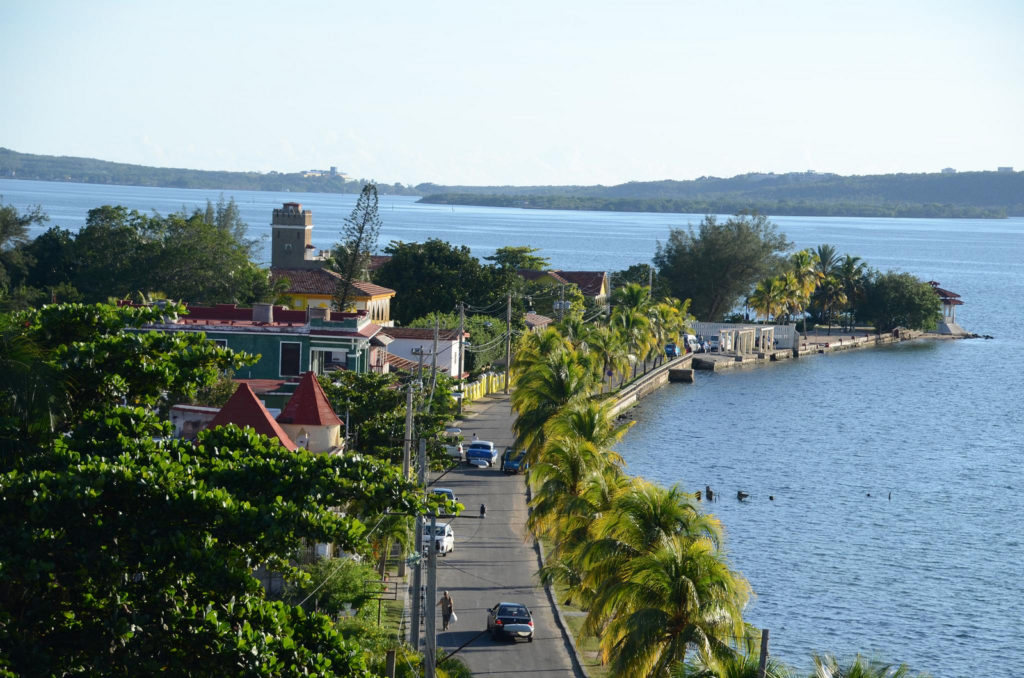LA GENERACION DE LA ESCASEZ HA TOMADO LAS CALLES DE CUBA
Muchos de los miles de cubanos que en estos días claman libertad son jóvenes que vivieron en sus carnes lo peor del Período Especial. Los jóvenes dicen que anhelan una Cuba mejor y por eso salieron a las calles a gritar “patria y vida”. “En mis 53 años nunca he visto nada igual en Santiago, este es el principio del fin de la tiranía en Cuba”. “La palabra hambre está grabada en mis huesos”.
DESDE QUE NACIÓ hasta casi los 20 años, Rubén creció en el seno de una familia disfuncional donde padeció desnutrición. “Mal comía una sola vez al día”, relata. Él es uno de los miles de jóvenes cubanos que en estos días protestan en las calles clamando libertad y el fin del actual sistema.
Como consecuencia de la falta de nutrientes, su cuerpo no se desarrolló normalmente. “Llegué a mi juventud con la apariencia de un niño de ocho años”, asegura. “Cuando aprendí a luchar mi sustento en la calle fue que pude por fin alimentarme un poquito más”. A partir de entonces, creció y recuperó lo que pudo. “Ahora soy uno de los que se comieron el miedo con el hambre, y voy pa’ donde sea gritando patria y vida”.
La escasez ha dejado marcas profundas en esta joven generación. “Recuerdo con tristeza que el pollo llegaba una vez al mes”, cuenta Ignacio. “En una de esas ocasiones mi madre me dejó la comida servida para almorzar cuando llegara de la escuela, y entrando a la casa vi impotente que el gato de la vecina se llevaba mi ración mensual de pollo”. Desde ese día odia profundamente a los gatos. “Y ahora estoy puesto: ¡abajo Díaz-Canel!”, grita.
Yamila, madre soltera de 23 años, está desesperada: “No tengo leche, cuando cortan la electricidad no hay pan, no alcanza el arroz, no alcanza el azúcar, no hay carne, no hay nadaaaaaa”, clama entre improperios. “Y tengo dos niños pequeños, ¿qué hago?”. Ella fue una de tantas otras madres santiagueras que salieron el 11 de julio a la calle a manifestarse.
En una de esas ocasiones mi madre me dejó la comida servida para almorzar cuando llegara de la escuela, y entrando a la casa vi impotente que el gato de la vecina se llevaba mi ración mensual de pollo”
El trabajo en Cuba no resuelve las necesidades de la juventud, por eso son muchos los que buscan otras opciones. “Ya me gradué de ingeniero civil, como quería mi papá, pero ahora, a tirar pasaje en la moto de mi tío”. Aquel domingo, Antonio era uno de los muchos motoristas que respaldaron la manifestación en Santiago de Cuba. “Yo no pienso pasarme la vida entera tirando pasaje. ¡Abajo el comunismo!”.
“Oye, habla con tu tía que vive en Italia y dile que ando buscando a un yuma para casarme, ya no aguanto la vida en el monte, si aquí no hay nada, allá en Songo es peor”, le pide Dalia, residente en ese municipio rural de la provincia de Santiago de Cuba, a su amigo Pedrito. “No importa si es viejo, aunque si es joven y fuerte mejor. Lo importante es que me saque de esta jaula. Tengo fotos en mi teléfono para que las envíes por internet”.
La pareja de profesionales formada por Eduardo y Marta está desconcertada. “A nuestros hijos les dimos la mejor educación posible, conforme al modelo comunista”, cuentan. Tras graduarse de la universidad, los hijos lo tuvieron claro: no podían seguir viviendo en Cuba, no querían seguir la estela de ruina, hambre y escasez que veían en sus padres.
Hoy la hija radica en Chile y el hijo en Bélgica, bien establecidos ambos en sus respectivas profesiones. Desde las trincheras en las redes apoyaron el estallido social en su patria.
Gisela cuenta estas cosas con cierta tristeza en el rostro. Se graduó como profesional de la Salud en 2018. “Comencé a trabajar ganando poco más de 1.000 pesos. Recuerdo que en aquel entonces con un dólar, que eran 25 pesos, podía transportarme ida y vuelta a mi trabajo y me comía un bocadito”. Ahora, con la Tarea Ordenamiento, gana casi 4.000 pesos. “Supuestamente es más dinero, pero en la práctica estoy igual o peor. La misma transportación hoy me cuesta 80 pesos, 40 por cada viaje, y el bocadito sale en 20, en total 100 pesos, cuatro veces más que antes. Y eso sin contar que casi todo lo demás que necesito se vende en las tiendas de MLC [moneda libremente convertible], a la que no tengo acceso”. Por eso, dice que anhela una Cuba mejor y salió a las calles a gritar “patria y vida”.
THE GENERATION OF SCARCITY HAS TAKEN THE STREETS OF CUBA
Many of the thousands of Cubans who are clamoring for freedom these days are young people who experienced the worst of the Special Period in their flesh. Young people say they long for a better Cuba and that is why they took to the streets to shout “homeland and life.” “In my 53 years I have never seen anything like it in Santiago, this is the beginning of the end of the tyranny in Cuba.” “The word hunger is etched in my bones.”
FROM BIRTH until he was almost 20 years old, Rubén grew up in a dysfunctional family where he suffered from malnutrition. “Mal ate only once a day,” he says. He is one of the thousands of young Cubans who these days are protesting in the streets demanding freedom and the end of the current system.
As a consequence of the lack of nutrients, his body did not develop normally. “I came to my youth looking like an eight-year-old,” he says. “When I learned to fight for my livelihood in the street, I was finally able to feed myself a little more.” From then on, he grew up and got back what he could. “Now I am one of those who ate fear with hunger, and I go anywhere shouting homeland and life.”
The scarcity has left deep marks on this young generation. “I remember with sadness that the chicken arrived once a month,” says Ignacio. “On one of those occasions my mother left the food served for me for lunch when I got home from school, and entering the house I saw helplessly that the neighbor’s cat was taking my monthly ration of chicken.” Since that day he deeply hates cats. “And now I’m on: down with Diaz-Canel!”, He yells.
Yamila, a 23-year-old single mother, is desperate: “I don’t have milk, when they cut the electricity there is no bread, there is no rice, there is no sugar, there is no meat, there is nothing, he cries out between expletives. She is one of the santiago’s mothers who went to the street on July 11.
Work in Cuba does not meet the needs of the youth, which is why many are looking for other options. “I have already graduated as a civil engineer, as my father wanted, but now, to throw passage on my uncle’s motorcycle.” That Sunday, Antonio was one of the many motorcyclists who supported the demonstration in Santiago de Cuba. “I’m not going to spend my entire life throwing tickets. Down with communism!”
“Hey, talk to your aunt who lives in Italy and tell her that I’m looking for a yuma to get married, I can’t stand life in the mountains anymore, if there’s nothing here, it’s worse in Songo,” asks Dalia, a resident of that rural municipality in the province of Santiago de Cuba, to his friend Pedrito. “It does not matter if he is old, although if he is young and strong better. The important thing is that he takes me out of this cage. I have photos on my phone so that you can send them online.”
The professional couple formed by Eduardo and Marta are puzzled. “We gave our children the best education possible, according to the communist model,” they say. After graduating from university, the children were clear: they could not continue living in Cuba, they did not want to follow the trail of ruin, hunger and scarcity that they saw in their parents.
Today the daughter lives in Chile and the son in Belgium, both well established in their respective professions. From the trenches in the networks they supported the social outbreak in their homeland.
Gisela tells these things with a certain sadness on her face. He graduated as a health professional in 2018. “I started working earning just over 1,000 pesos. I remember that back then with one dollar, which was 25 pesos, I could travel back and forth to my job and ate a snack.” Now, with the Ordering Task, she earns almost 4,000 pesos. “Supposedly it is more money, but in practice I am the same or worse. The same transportation today costs me 80 pesos, 40 for each trip, and the snack is 20, in total 100 pesos, four times more than before. And that without to say that almost everything else I need is sold in MLC [freely convertible currency] stores, which I don’t have access to. ” For this reason, she says that she longs for a better Cuba and took to the streets to shout “homeland and life.”
Agencies/ 14ymedio/ Alberto Hernández, Santiago de Cuba/ Internet Photos/ Arnoldo Varona/ Videos/Photos> La Historia de Cuba
THE CUBAN HISTORY, HOLLYWOOD.



 CUBA TODAY: The Generation of Scarcity has Taken the Street of Cuba. PHOTOS. * CUBA HOY: La Generación de la Escasez Ha Tomado las Calles de Cuba. PHOTOS.
CUBA TODAY: The Generation of Scarcity has Taken the Street of Cuba. PHOTOS. * CUBA HOY: La Generación de la Escasez Ha Tomado las Calles de Cuba. PHOTOS.







